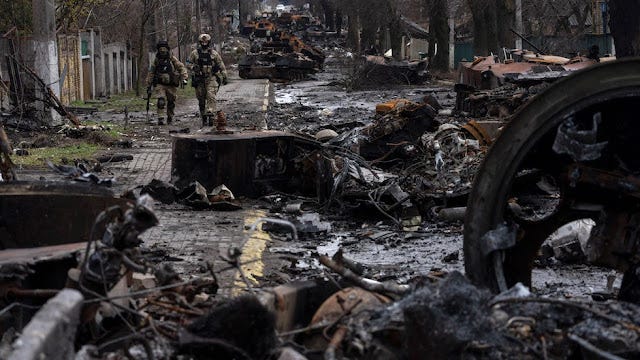How Do You Work With the Russians at the Negotiating Table and Post-Conflict?
trust the view from Narva
While there is a lot more fighting left to be done in Ukraine, there is one safe assumption regardless of what happens; we will have to learn to live with Russia as she is.
Russian victory in Ukraine runs the spectrum from unconditional surrender of Ukraine to a negotiated settlement that lets Russia retain Crimea and the Donbas.
One may define a Ukrainian victory on an extreme edge with Russia retaining only Crimea over to being expelled entirely back to pre-2014 boundaries. The longer the war goes on, the less the Ukrainians will find the Crimea option acceptable, and we may already be past that point.
If you think the war will be the end of the Russian desires in her near-abroad, then you have not studied enough Russian history.
Russia will always be Russia. All you can do is to realistically accept that and adjust accordingly.
In the post-Cold War era there were well meaning but wrong people who thought Russia was just a Western nation with a rough childhood.
Do you remember 2003’s “Spinning Boris” loosely based on the American political consultants rescuing Boris Yeltsin in the 1996 election in Russia? You can watch, I believe, the whole movie here, but just get a little flavor of a shirtless Goldbloom;
We can call that the high/low-water mark of post-Cold War arrogance to Russia that carried on until the middle of the last decade when the balance of people realized with the invasion of Crimea and eastern Ukraine that the doves may not have it quite right.
Up until the invasion of Ukraine this year, there was still hope that somehow Russia could be contained as a slightly dangerous but otherwise manageable hydrocarbon extraction territory.
A lot of those same people (Department of State and the Joint Staff, I’m looking at you) quickly moved as the invasion was on the way to, “Russia is unstoppable” and tried to convince the Ukrainian government that their best bet was to retreat to Lviv but probably best to leave the country while they had the chance.
Of course, President Zelenskyy used that as an opportunity in February to deliver one of his best lines to President Biden and the world’s Smartest People in the Room™;
So, my preference here is to not listen too much to what is coming out of DC and Brussels. They have been too wrong for too long. I prefer to listen to those who have generations deep understanding of the Russians; the Central Europeans and the Baltic Republics. They will best inform us of how we should position ourselves relative to Russia.
What is the informed opinion, as much as one can be found?
Regulars here know my affection for Estonia and the Estonian people. As such, let’s check in with their superb Prime Minister Kaja Kallas;
I warned about premature calls for a ceasefire and peace. We cannot give anything to the aggressor that it didn’t have before – or the aggression will sooner or later return. No sign Russia has changed its calculus. I don't believe in goodwill by an outright aggressor and a cold-blooded war criminal.
We must avoid a bad peace. A badly negotiated peace for Ukraine would mean a bad peace for us all. We need to focus on pushing back the aggressor and drying up his war machine.
What Ukraine needs today are weapons to fight back the aggressor and liberate its territories. We need to help Ukraine win. And we need to make a leap forward in our own defence.
What is victory? This is solely up to Ukraine to define. But we must help them to reach the best position for any negotiations with the aggressor.
The Russian threat will not go away tomorrow. We mustn't get tired. After all, Ukrainians are not tired.
This is sound. I think I will adopt this as the Salamander Position.



Good analysis and good writing, salted with some humor. Enjoyed it!
Here's an excerpt from an interesting article I found: "One way in which Russia will be able to turn other states against Atlanticism will be an astute use of the country's raw material riches. "In the beginning stage [of the struggle against Atlanticism]," Dugin writes, "Russia can offer its potential partners in the East and West its resources as compensation for exacerbating their relations with the U.S." (276). To induce the Anaconda to release its grip on the coastline of Eurasia, it must be attacked relentlessly on its home territory, within its own hemisphere, and throughout Eurasia. "All levels of geopolitical pressure," Dugin insists, "must be activated simultaneously" (367).
Within the United States itself, there is a need for the Russian special services and their allies "to provoke all forms of instability and separatism within the borders of the United States (it is possible to make use of the political forces of Afro-American racists)" (248). "It is especially important," Dugin adds, "to introduce geopolitical disorder into internal American activity, encouraging all kinds of separatism and ethnic, social and racial conflicts, actively supporting all dissident movements-- extremist, racist, and sectarian groups, thus destabilizing internal political processes in the U.S. It would also make sense simultaneously to support isolationist tendencies in American politics" (367). ... At one point in his book, Dugin confides that all arrangements made with "the Eurasian bloc of the continental West," headed by Germany, will be merely temporary and provisional in nature. "The maximum task [of the future]," he underscores, "is the 'Finlandization' of all of Europe" (369)." "Aleksandr Dugin's Foundations of Geopolitics", by John B. Dunlop, a senior fellow at the Hoover Institution whose current research focuses on the conflict in Chechnya, Russian politics since 1985, Russia and the successor states of the former Soviet Union, Russian nationalism, and the politics of religion in Russia, at https://tec.fsi.stanford.edu/docs/aleksandr-dugins-foundations-geopolitics (First published in Demokratizatsiya 12.1 (Jan 31, 2004): 41.)